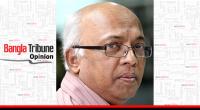 On Oct 29, the Election Commission finally published the gazette notification revoking the registration of Jamaat-e-Islami as a political party in Bangladesh. In March 2017, the EC dropped Jamaat’s logo Daripalla (weighing scale) from the electoral symbols following a Supreme Court order.
On Oct 29, the Election Commission finally published the gazette notification revoking the registration of Jamaat-e-Islami as a political party in Bangladesh. In March 2017, the EC dropped Jamaat’s logo Daripalla (weighing scale) from the electoral symbols following a Supreme Court order.
The latest EC gazette notification came after five years of the High Court verdict from August 2013, when the court ruled that the registration of the party was illegal and invalid due to not complying with certain conditions of the country’s main electoral law, the Representation of the People’s Order (RPO).
Neither the HC verdict nor the EC move will appear surprising if one has even a cursory look at the charter of Jamaat which makes no mention of the legitimacy of the Bangladesh Parliament to legislate or the supremacy of the country’s Constitution and relegates the role of non-Muslims in the party to associate members only. Suffice it to say, there is no reference to the country’s struggle for independence, Liberation War or founding principles as enshrined in the Constitution itself.
This effectively means that Jamaat, as a party, will not be able to participate in the upcoming parliamentary election. However, I doubt many people will shed a tear for the fate of the organisation, except maybe its loyal supporters and those who work for, or benefit from, it. From 1971 to 2018, Jamaat has done little to garner any sympathy from the wider public.
After Independence, Jamaat was among the five communal parties that were banned by the first government of Bangladesh. It was only after the assassination of the Father of the Nation Bangabandhu Sheikh Mujibur Rahman in August 1975, military ruler Ziaur Rahman allowed Jamaat and the other banned communal parties to re-enter the political landscape of Bangladesh.
During the 1971 War of Liberation, Jamaat not only politically opposed the idea of an independent and sovereign Bangladesh but also acted as an auxiliary force of the invading Pakistani army. By forming vigilante militias like the Razakars, al-Badr and al-Shams, it helped the Pakistani forces get crucial grassroots intelligence about freedom fighters and pro-independence individuals.
Their members and leaders directly and willingly participated in the nine-month-long genocide through killing, raping, looting, forced conversions, forced displacements and arson campaigns of the Pakistan army. They even played a key role in the plan to rid Bangladesh of its intellectuals through the formation of infamous killing squads.
The International Crimes Tribunal-Bangladesh (ICT-BD), in several of its verdicts, termed Jamaat a ‘criminal organization’ for its role in 1971. Several of their top leaders have been convicted and executed for the most serious of war crimes and crimes against humanity.
Investigators have recommended prosecuting Jamaat itself as an organization for the crimes of 1971. Campaigners are calling for an amendment to the International Crimes (Tribunals) Act 1973 for accommodating the trial of Jamaat as a criminal organisation, like the trial of the Nazi Party after World War II.
The saddest part is that even after 47 years, Jamaat activists and supporters still have not owned up to their shameful and criminal past. Rather than disown their war criminal leaders, they have spent millions on lobbying internationally to discredit the ICT-BD trials and the justice process set up to secure accountability for the crimes of 1971.
Rather than apologising to the people of Bangladesh, they unleashed separate waves of violence on civilians and law enforcement officials after each and every verdict of the ICT-BD. These show that even the new generation followers and members of Jamaat are no less fanatic than their war criminal predecessors.
The student wing of Jamaat, Islami Chhatra Shibir, has as violent a record, if not more, like its parent organization. During 1971, members of Shibir’s predecessor Islami Chhatra Shangha were willing perpetrators of the genocide. They were instrumental in the formation of killing squads such as al-Badr and al-Shams and implementing the devious design to rid an infant nation of its intellectuals right before the dawn of victory.
After independence, Shibir played a major role in the criminalization of student politics in Bangladesh. From the 80s onward, Shibir terrorised the student populace in general and progressive student organizations in particular by employing terror tactics such as slitting the veins and tendons of political opponents and throwing bombs at anyone considered a potential threat to their extremist ideology.
For almost three decades, they maintained this reputation of terror by killing and severely injuring several of its opponents, especially in the Chattogram (Chittagong) and Rajshahi regions. Their targets mostly included activists of Chhatra League, Chhatra Union, Chhatra Moitri, socialists, freedom fighters, female students and teachers known to have a progressive ideology. In fact, until 2001, even the members and leaders of the student wing of Bangladesh Nationalist Party, Chhatra Dal, did not evade the wrath of Shibir.
In a repeat of the horrors of 1971, when Jamaat came to state power riding on the back of BNP in 2001, once again it showed its vehemently communal stance as it unleashed violence on a nationwide scale on the religious minorities, especially on the Hindus. Immediately after the election, the pogrom started and continued for the next five years, often patronised by the state machinery of the then BNP-led administration.
The role of Jamaat in persecuting religious minorities between 2001 and 2006 has been widely documented by organizations like the Amnesty International, Canadian Government, Freedom House and the US State Department. According to a White Paper published by the Ekattorer Ghatak Dalal Nirmul Committee, more than 10,000 incidents of communal attacks were reported in the four years of BNP-Jamaat rule from 2001-05.
The fact that Jamaat would attack minorities under any excuse was demonstrated again in February and March 2013 following the war crimes conviction of one of its top leaders Delwar Hossain Sayeedi. Following the verdict, activists of Jamaat and its student wing Shibir attacked Hindus in different parts of the country. Hindu properties were looted, houses were burnt and temples were desecrated and set on fire.
Jamaat, and especially Shibir’s violence surrounding the ICT-BD verdicts were so widespread that according to IHS Jane’s ‘Global Terrorism & Insurgency Attack Index’, Shibir came third among all the violent non-state actors who committed global terrorism and insurgency-related attacks in 2013.
Another wave of anti-minority attacks by Jamaat and BNP followed after the 10th parliamentary election in 2014. According to police reports submitted to the High Court Division, around 160 incidents of attacks and atrocities on Hindus took place in 21 districts after the Jan 5 election. The atrocities include injuring Hindu people, damaging their houses, temples and business establishments and setting them on fire, and looting valuables.
It should also never be forgotten that Jamaat and Shibir have always performed the function of being a trusted source for the supply of endless human resources for the hardcore terrorist organisations in Bangladesh. Whether it’s Harkat-ul-Jihad Al Islami, Bangladesh (HuJI-B) or the Jama'atul Mujahideen Bangladesh (JMB), a number of their top brass and key commanders have had past associations with either Jamaat or Shibir.
When the then-JMB chief Shaykh Abdur Rahman was arrested from Sylhet in March 2006, a number of jihadi literature were recovered from his possession, some of which were written by Jamaat founder Abul Ala Moududi and its former Ameer Golam Azam, who died a 1971 war crimes convict.
The links became clear in 2010 from the detained chief of the outfit Saidur Rahman alias Zafar who told interrogators that there were at least 25 Jamaat ‘Rokons’ [members] who were also concurrently holding posts in JMB at that time.
The ten trucks arms haul case and the conviction of ex-Jamaat Ameer Motiur Rahman Nizami exposed how Jamaat, in partnership with BNP, was and remains anti-India not only in rhetoric but also through dangerous foreign policy. The close links with Pakistan’s shadowy intelligence wing, ISI, and terrorist groups based in Pakistan and Afghanistan have also been revealed in detail by the confessional statements of one of the convicts of the Aug 21 grenade attack case, Hujbul Mujhaeedin operative Yusuf Bhat, a Pakistani national.
Let us also not overlook the role of Jamaat in the Aug 21 grenade attack. We know from the witnesses deposed and evidence presented that Jamaat’s Assistant Secretary General Ali Ahsan Md Mojaheed was one of the key planners of the attack, present in the meeting at the infamous Hawa Bhaban with the other conspirators. He was dropped from the indictment because he was hanged for his war crimes of 1971, in particular, the killing of Bengali intellectuals.
It is, therefore, hardly surprising that there is a very strong campaign in Bangladesh for banning Jamaat. Various civil society groups, rights bodies, professionals groups, cultural organizations, Liberation War-related organizations, social groups, secular activists and various citizens’ platforms have been consistently demanding a ban on the right of Jamaat to do politics for quite a while now.
In fact, following the 2013-14 violence of Jamaat, many Asian and European diplomats directly asked BNP to cut ties with Jamaat. Even the European Parliament, in an oblique reference to Jamaat, in a resolution on Bangladesh dated Jan 16, 2014, stated:“…parties which turn to terrorist acts should be banned”.
Lastly, it should be remembered that the loss of registration is a procedural issue, which can be overcome by Jamaat by rectifying the provisions of its charter that contravene the RPO. Jamaat will then have the option to reapply for registration to the Election Commission, but the process will time consuming, and certainly not one that can be completed before the next election.
Thus, short of banning Jamaat and putting it on trial for its crimes of 1971, many cannot take full satisfaction. But for time being, relief can be had, temporary though it may be, from the fact that the election symbol of the party, which has never believed in the very idea of Bangladesh, will not be on the ballot paper on the next voting day.
Shah Ali Farhad is a lawyer, researcher and political activist. He is a senior analyst at the Centre for Research and Information (CRI).
 Opinion
Opinion
30870 hour(s) 39 minute(s) ago ;
Morning 01:33 ; Thursday ; Apr 25, 2024
No tears shed for Jamaat’s loss
Send
Shah Ali Farhad
Published : 16:44, Oct 31, 2018 | Updated : 19:09, Feb 06, 2019
Published : 16:44, Oct 31, 2018 | Updated : 19:09, Feb 06, 2019
0 ...0 ...
/zmi/
Topics: Shah Ali Farhad
***The opinions, beliefs and viewpoints expressed in this article are those of the author and do not reflect the opinions and views of Bangla Tribune.
- KOICA donates medical supplies to BSMMU
- 5 more flights to take back British nationals to London
- Covid19: Rajarbagh, Mohammadpur worst affected
- Momen joins UN solidarity song over COVID-19 combat
- Covid-19: OIC to hold special meeting
- WFP begins food distribution in Cox’s Bazar
- WFP begins food distribution in Cox’s Bazar
- 290 return home to Australia
- Third charter flight for US citizens to return home
- Dhaka proposes to postpone D8 Summit
Unauthorized use of news, image, information, etc published by Bangla Tribune is punishable by copyright law. Appropriate legal steps will be taken by the management against any person or body that infringes those laws.
Bangla Tribune is one of the most revered online newspapers in Bangladesh, due to its reputation of neutral coverage and incisive analysis.
F R Tower, 8/C Panthapath, Shukrabad, Dhaka-1207 | Phone: 58151324; 58151326, Fax: 58151329 | Mob: 01730794527, 01730794528


